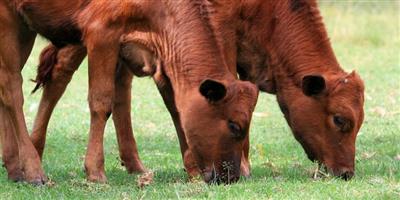Feedstuffs magazine reports:
In the beef industry, conventional wisdom holds that the quality of beef suffers as the yield – the amount of boneless, closely trimmed retail cuts – increases and vice versa. However, the initial results of WTAMU's research involving cloned cattle demonstrate that it is possible to improve both simultaneously, which means higher-value beef can be produced without wasteful trim fat.
“This outcome indicates that the antagonistic relationship between beef carcass quality and yield can be overcome by crossing rarely occurring animals,” said Dr. Ty Lawrence, professor of meat science and lead researcher on the project.
In 2012, WTAMU successfully cloned a bull, which they named Alpha, from the carcass of a steer that graded Prime, Yield Grade 1 – the best combination of quality grade and yield grade in the U.S. Department of Agriculture's beef evaluation system. Such a rating is only achieved by about 0.03{75e25ebeb47fb4337942be2c10689dca1c292c2a66240b62c5ca4214f5b25ecc} of all beef carcasses. Three heifers – Gammas 1, 2 and 3 – were cloned from another Prime, Yield Grade 1 carcass.
While not clones themselves, the 13 calves of Alpha and the Gammas were the first bovine offspring ever produced from two cloned carcasses. Last month, seven of them were harvested. The seven steer carcasses were evaluated by a third-party USDA beef-grading supervisor and graded significantly above the industry average. One of the seven achieved the Prime grade, three graded High Choice and three were Average Choice. The industry average is Low Choice. Industry-wide, less than 5{75e25ebeb47fb4337942be2c10689dca1c292c2a66240b62c5ca4214f5b25ecc} of all beef – fewer than one in 20 carcasses – grades Prime.
“As someone who has been following this project closely, I am extremely excited by these results, which have the potential to revolutionize the beef industry,” said Texas A&M University system chancellor John Sharp. “I'd like to offer the research team at WTAMU, as well as their industry partners, my congratulations. The Texas A&M System is committed to conducting cutting edge research with practical applications, and their work is a fine example of our philosophy in action.”
All seven of WTAMU's steers produced a yield grade of 1 or 2. The industry average is a 3. Compared to the average animal reported in the 2011 National Beef Quality Audit, the offspring of Alpha and the Gammas have 16{75e25ebeb47fb4337942be2c10689dca1c292c2a66240b62c5ca4214f5b25ecc} less trim fat, 9{75e25ebeb47fb4337942be2c10689dca1c292c2a66240b62c5ca4214f5b25ecc} more ribeye and 45{75e25ebeb47fb4337942be2c10689dca1c292c2a66240b62c5ca4214f5b25ecc} more marbling.
“By finding, cloning and crossing these rare genetics, we have demonstrated the ability to create exactly what the market desires: high-quality taste fat without unnecessary waste fat,” Lawrence said.
These findings have been five years in the making and the ongoing project has included numerous partners. WTAMU teamed up with ViaGen, a private company now based in Cedar Park, Texas, to develop the initial clones for the purposes of breeding them.
CLICK HERE to read more
Source: Agri-Marketing
Pixabay Photo CC0 Public Domain


